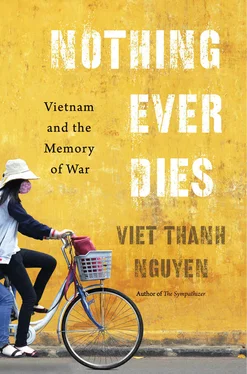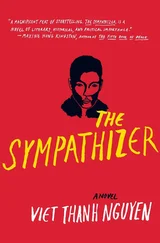Faced with how individuals and states compromise, abuse, and exploit forgiveness and reconciliation, its related term, Derrida argues that forgiveness “is not, it should not be, normal.” 16Rather, “forgiveness must announce itself as impossibility itself,” something not dependent on the repentance of the person or entity one might forgive. 17I must admit that on first encountering Derrida’s notion of forgiveness, I struggled with it, for it was, in his own words, “excessive, hyperbolic, mad.” 18If something is unforgivable, how can it be forgiven? Mass bombing, massacres, death camps, genocide, not to speak of the loss of an individual life — can any of these be forgiven? Not having experienced any of these myself, I cannot say. What I lost was a homeland that I sometimes do not even enjoy visiting; a relationship with an adopted, left-behind sister whom I have seen once in forty years; perhaps a happier childhood; and perhaps happier, healthier parents. But then again, if the war had not been fought and I had not lost these things, I would not be writing these words. I might not be a writer at all to whom the question of forgiveness never occurred until I wrote this paragraph. Now I think, yes, I can forgive, in the abstract, America and Vietnam — in all their factions and variations — for what they have done in the past. But I cannot forgive them for what they do in the present because the present is not yet finished. The present, perhaps, is always unforgivable.
What about pragmatic moments of forgiveness that allow things such as reparations, returns, or recognitions to happen? Are they inconsequential? In the case of my war, even these pragmatic acts are rare. The United States pays a pittance to remove the tons of unexploded ordnance that it dropped in Vietnam, Laos, and Cambodia. It refuses to admit that Agent Orange damaged and damages human beings and the land in Southeast Asia. Many Southeast Asian exiles and refugees continue to hate their communist enemies, do not recognize the communist government, and are afraid or unwilling to return. The communists in Vietnam and Laos have never apologized for reeducation camps and the persecution of people who turned into refugees. The Cambodian government is reluctant to acknowledge the widespread complicity of many people, including its own politicians and leaders, in the Khmer Rouge. A list of sensible things that people and governments could do to admit to the errors and horrors of the past include: truth and reconciliation commissions to encourage face to face dialogue between enemies; trials of war criminals, or at least offers of amnesty which acknowledge that certain people committed criminal acts; returning the homes and property of refugees, which may now be owned by other historical victims; erecting memorials to dead refugees and dead soldiers of the other side; constructing a curriculum that acknowledges all sides; allowing a civil society that can dissent and discuss the past freely; and staging dramas of genuine and mutual apology, instead of the more typical dramas of grief and resentment. Any of these would be enormously difficult but would help to heal the wounds of the past and encourage people and governments to move forward without denying the past.
Instead, we have well-intentioned if flawed efforts such as the United Nations — sponsored Extraordinary Chambers of the Courts of Cambodia, its mandate to prosecute only five high-ranking individuals for the crimes of the Khmer Rouge. The trial has gone on for years and will go on for years, at least until all the aging defendants are dead, or, in the case of one, demented and beyond prosecution. This is literally political theater, one with the duration of a hit Broadway musical and much more expensive to produce. In a country where the average salary is hundreds of dollars per year, the cost of the trials runs into the tens of millions of dollars. In order to visit this theater outside of Phnom Penh, one must make reservations and arrive early. No pictures are allowed, as is the case with any theater. On the morning I visited, high school students occupied most of the seats. This drama was pedagogical, for the Cambodian people receive little education in regard to the genocide. While the court will mete out some kind of justice, this is also a show meant to assure Cambodians that their government is addressing the past, even when its efforts are weak. And it is a show meant to assure the world that the United Nations carries out its mission of staunching the bleeding of the world’s injuries, even when it cannot do so.
The trial is set on a stage in front of the auditorium, reinforcing the theatrical quality. A wall of glass, and behind that glass, a curtain, separates the audience from the participants — judges, lawyers, defendants, witnesses, translators, stenographers, and guards. When the audience files in and sits down in the air-conditioned auditorium, the curtain is drawn. The show begins, the curtain opens, and the actors arrive on stage to assume their places in this pseudo-trial. The guaranteed convictions that will result from this trial, while worthwhile, will only lead to a pseudo-reconciliation with the past. The inequality and injustice that led to the rise of the Khmer Rouge still remain, and the unforgivable will not be forgiven. Even the one who asked for forgiveness, Duch, the commandant of S-21, the first one convicted and sent to prison, will not be forgiven. As for the thousands of other Khmer Rouge still alive, many in power or at least in relative peace, and the governments of Vietnam, China, and the United States — none of them will ask for forgiveness, even if they were on trial, which they are not.
But Derrida does not deny pseudo-forgiveness and pseudo-reconciliation a role to play in dealing with the past. It is only that the peace they realize is temporary, an absence of war and violence rather than their negation. Instead of compromise, he only insists on the impossible standard of a pure forgiveness. As unreasonable as it may sound, pure forgiveness is commensurate with the unbearable weight of history’s accumulated horrors and our own individual responsibilities. Why is it possible to murder millions and yet impossible to imagine pure forgiveness or just forgetting? Shouldn’t mass murder be impossible? The fault is our own. There is no one else to blame for the limits of our spirit and our imagination. We submit to the pragmatists, the profiteers, and the paranoiacs who insist that war is part of humanity, our identity. They are half-right but all wrong in believing that we cannot convert the recognition of our inevitable inhumanity into a different kind of realism, a realism that believes we must imagine peace, no matter how impossible it may seem. It is perpetual war that is unrealistic. Perpetual war is madness, engineered in the rational language of bureaucracy and the high-flown rhetoric of nationalism and sacrifice, operating through campaigns that could lead to human extermination. This madness can only be matched by the logic of perpetual peace and the excessive, utopian commitment to a pure forgiveness, which the species needs to survive. If we wish to live, we need a realism of the impossible.
Thich Nhat Hanh, who inspired Martin Luther King Jr., provides another perspective on “the situation of a country suffering war or any other situation of injustice.” Rather than laying the blame on one side or another, he says, “every person involved in the conflict is a victim.” This is obviously a difficult perspective to adopt for those who consider themselves to be victims or the descendants of victims. Nevertheless, “see that no person, including all those in warring parties or in what appear to be opposing sides, desires the suffering to continue. See that it is not only one or a few persons who are to blame for the situation.” But in saying that no one single agent is to blame, he does not absolve us of blame. “See that the situation is possible because of the clinging to ideologies and to an unjust world economic system which is upheld by every person through ignorance or through lack of resolve to change it.” Even more, the duality of conflict itself, the either-or of war and hatred, is illusory: “See that two sides in a conflict are not really opposing, but two aspects of the same reality.” Increasingly, Vietnam and America appear to be part of the same reality. Once symbolic of Cold War division, these two countries now participate in the onward march of global capitalism, military-industrial complexes, the dominance of self-interested political parties, the survival of nation-states, and the perpetuation of power for the sake of power. What, then, was the war good for, if in the end all that will happen is yet another war? “See that the most essential thing is life and that killing or oppressing one another will not solve anything.” 19
Читать дальше












